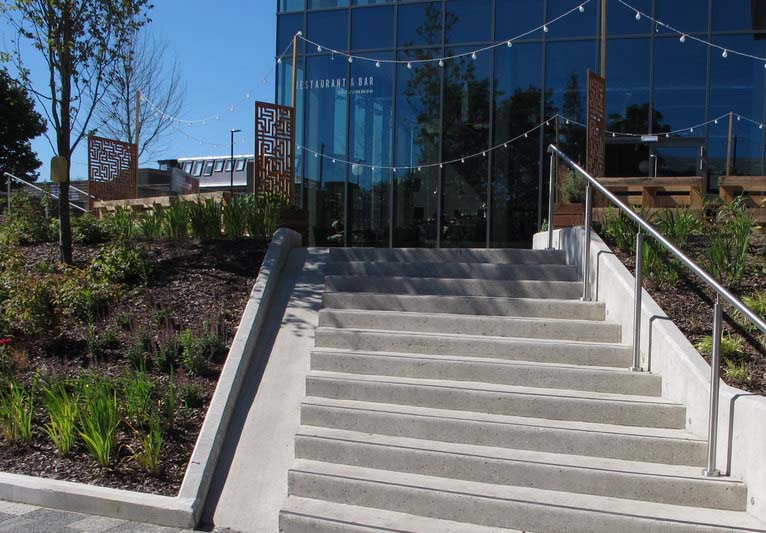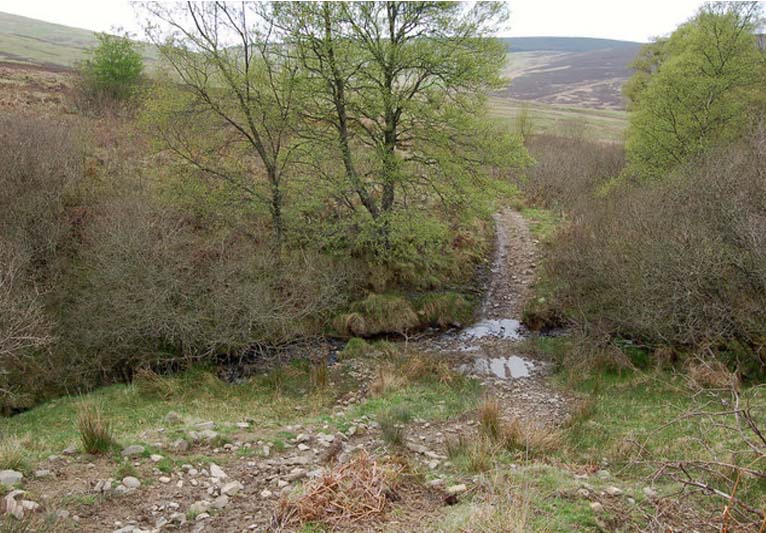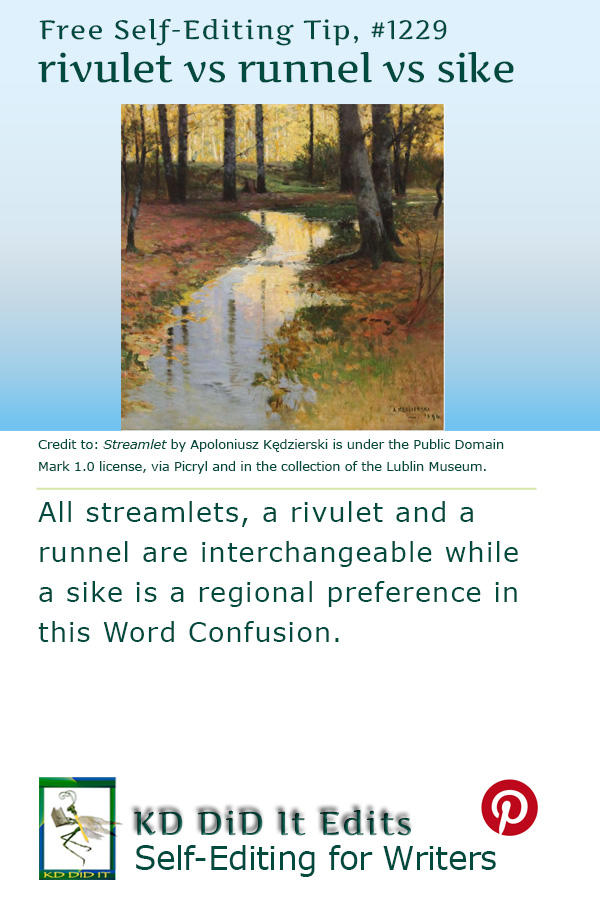I can’t help it, I’m fascinated by the various terms for bodies of water. In this case, this word confusion is about streamlets, tiny streams of water, a rivulet vs a runnel vs a sike.
A rivulet and a runnel are both defined as brooks. Essentially each means the same thing. Which you choose is up to you. Just remember to be consistent. Runnel does have a more “man-made” feel to it with one of its definitions referring to it as a channel or course.
A sike is a regional “body” of water frequently used to set boundaries.
Exploring Later . . .
Other stream word confusions that might interest you include “River vs Stream vs Tributary“, “Born vs Borne vs Bourn“, “Brook vs Burn vs Draw vs Lick“, “Channel vs Dyke vs Rill“, and/or “Creak versus Creek“.
Posts on other bodies of water include “Anchorage, Haven, Moorage, and Roadstead“, “Arroyo vs Coulee vs Wadi vs Wash“, “Bay vs Bight vs Cove“, “Bayou vs Bog vs Marsh vs Swamp“, “Canal vs Impoundment vs Moat vs Reservoir“, “Cay vs Key vs Quay“, “Dam versus Damn“, “Delta vs Estuary vs Rapids vs Source“, “Dock vs Pier vs Wharf“, “Firth vs Fjord vs Gulf“, “Harbor vs Marina vs Port vs Quay“, “Lakes: Kettle, Loch, Mere, and Oxbow“, “Ocean versus Sea“, “Peer versus Pier“, “Sea versus See“, “Slew versus Slough“, and “Straight versus Strait“.
Word Confusions . . .
. . . started as my way of dealing with a professional frustration with properly spelled words that were out of context in manuscripts I was editing as well as books I was reviewing. It evolved into a sharing of information with y’all. I’m hoping you’ll share with us words that have been a bête noire for you from either end.
If you found this post on “Rivulet vs Runnel vs Sike” interesting, consider subscribing to KD Did It, if you’d like to track this post for future updates.
| Rivulet | Runnel | Sike |
|---|---|---|

A Person Working Out Intensely, Sweating Profusely by W Holtsmeier is under the CC BY 3.0 license, via DeviantArt. — Shaking off rivulets of sweat. |

Cycle Channel by Steps From Canal Towpath by David Hawgood is under the CC BY-SA 2.0 license, via Geograph.org.uk. — The trough may also be called a wheeling ramp, push ramp, or runnel. |

Black Sike by Jim Barton is under the CC BY-SA 2.0 license, via Wikimedia Commons and courtesy of Geograph.co.uk. |
| Part of Grammar: | ||
| Noun
Plural: rivulets |
Noun
Plural: runnels, runs, runlets A.k.a. run, runlet |
Noun
Plural: sikes, sykes A.k.a. syke |
| [Physical Geography; UK, US literary] A very small stream or brook | [Physical Geography] A rivulet
A narrow channel or course, as for water |
[Physical Geography] A small stream
[Scottish and Northern English] A ditch or gully, especially one that fills with water after a heavy rain |
| Examples: | ||
| Sweat ran in rivulets down his back.
“The next day we crossed over the top of the mountain, and upon the other side we came to a tiny rivulet which we followed down into a great forest” (Burroughs, ch 15). “After a steep climb and a short walk they halted at the edge of a precipitous cliff and Schneider looked down into a narrow gulch where a single tree grew beside a tiny rivulet and sparse grass broke from a rock-strewn soil” (Burroughs). Grateful, the thirsty hikers rejoiced on seeing the rivulet. |
“And while they talked, the voices of the snow-waters round them diminished one by one as the night-frost choked and clogged the runnels” (Kipling, ch 13).
“Several western king birds perched on the impenetrable Tule reeds fortifying the runnel’s banks swayed in the warm breeze” (Graham). She flung a “runnel of scissor sucking red ribbon into its current then releasing it” (Kolbe, pp 130–131). “A terraced stormwater fountain and runnel system utilizes captured stormwater to create human connections with natural systems and to reduce stormwater leaving the site” (Raleigh). It was so hot that there were runnels of sweat running down his face. |
“Tarn (a mountain pool), grain, and sike (mountain streams) are also Scandinavian terms” (Various, p 418).
“The whyche syke was wonte in my tyme and in my fadyr days as he sayd me to be drawyn with a plough for a mere on that syde bytwene Sand Hoton and Brakynbargh” (c.1490). “. . . and by le syk an acre of land abutting on le Wellecroft” (1352; Parlington). Frequently used as boundary lines, there was “one sicke or brook which parts Derbyshire and Hallamshire” (Jan). |
| History of the Word: | ||
| Late 16th century in an alteration of the obsolete riveret, from the French, literally meaning small river, perhaps suggested by the Italian rivoletto, a diminutive of rivolo, based on the Latin rivus meaning stream. | Late 16th century, denoting a brook or rill; a variant of dialect rindle, influenced by the verb run.
In Old English a stream was a ryne, and a teeny tiny stream was a rynel, the source of runnel. |
First recorded in 1300–50; Middle English, from the Old Norse sīk meaning small stream, ditch, pond; cognate with the Old English sīc meaning rill, the Middle Low German sīk meaning puddle; akin to the Old High German seih meaning urine, the Old English sicerian meaning to ooze. |
C’mon, get it out of your system, bitch, whine, moan . . . which words are your pet peeves? Also, please note that I try to be as accurate as I can, but mistakes happen or I miss something. Email me if you find errors, so I can fix them . . . and we’ll all benefit!
Satisfy your curiosity about other Word Confusions on its homepage or more generally explore the index of self-editing posts. You may also want to explore Book Layout & Formatting Ideas, Formatting Tips, Grammar Explanations, Linguistics, Publishing Tips, the Properly Punctuated, Writing Ideas and Resources, and Working Your Website.
Resources for Rivulet vs Runnel vs Sike
Some of these links may be affiliate links, and I will earn a small percentage, if you should buy it. It does not affect the price you pay.
Apple Dictionary.com
Burroughs, Edgar Rice. The Return of Tarzan. Originally published 1913. Positronic Publishing, 2020. <https://amzn.to/3sHWrps>. Ebook.
⸻. Tarzan the Untamed. Originally published 1920. 2020. <https://amzn.to/3ueGS9n>. Ebook.
Dictionary.com: sike
The Free Dictionary: rivulet, runnel, sike
Graham, Chuck. “Peaks and Valleys.” American Forests. 11 June 2019. Accessed 14 Nov 2023. <https://www.americanforests.org/article/peaks-and-valleys/>.
“jan 1, 1635 – syke.” Yorkshire Historic Dictionary 2. Public Timelines. Time Graphics. 15 June 2018. Accessed 14 Nov 2023. <https://time.graphics/event/1287194>.
Kipling, Rudyard. Kim. Originally published 1901. Fingerprint! Publishing, 2018. <https://amzn.to/3QvAbac>. Print.
Kolbe, Laura. “Garter, Copper, Water.” Prairie Schooner, vol 90, no 4. Project Muse. University of Nebraska Press. 22 Dec 2016. Accessed 14 Nov 2023. 10.1353/psg.2016.0100.
Parlington.
Raleigh, Stewart. “Duke University Medical Center Open Space, Mary Duke Biddle Trent Semans Center for Health Education Durham, NC.” Healthcare Design. 1 Oct 2014. Accessed 14 Nov 2023. The Free Library. <https://www.thefreelibrary.com/Duke+University+Medical+Center+Open+Space%2c+Mary+Duke+Biddle+Trent…-a0404270981>.
“Syke.” Yorkshire Historical Dictionary. n.d. Accessed 14 Nov 2023. <https://yorkshiredictionary.york.ac.uk/words/syke>.
Various. “England to English Finance.” The Encyclopædia Britannica: A Dictionary of Arts, Sciences, Literature, and General Information. ed 11, vol 9, sl 4. Project Gutenberg, 2010. Accessed 14 Nov 2023. <https://www.gutenberg.org/files/32940/32940-h/32940-h.htm>.
Vocabulary.com: runnel
Pinterest Photo Credits:
Streamlet by Apoloniusz Kędzierski is under the Public Domain Mark 1.0 license, via Picryl and in the collection of the Lublin Museum.


